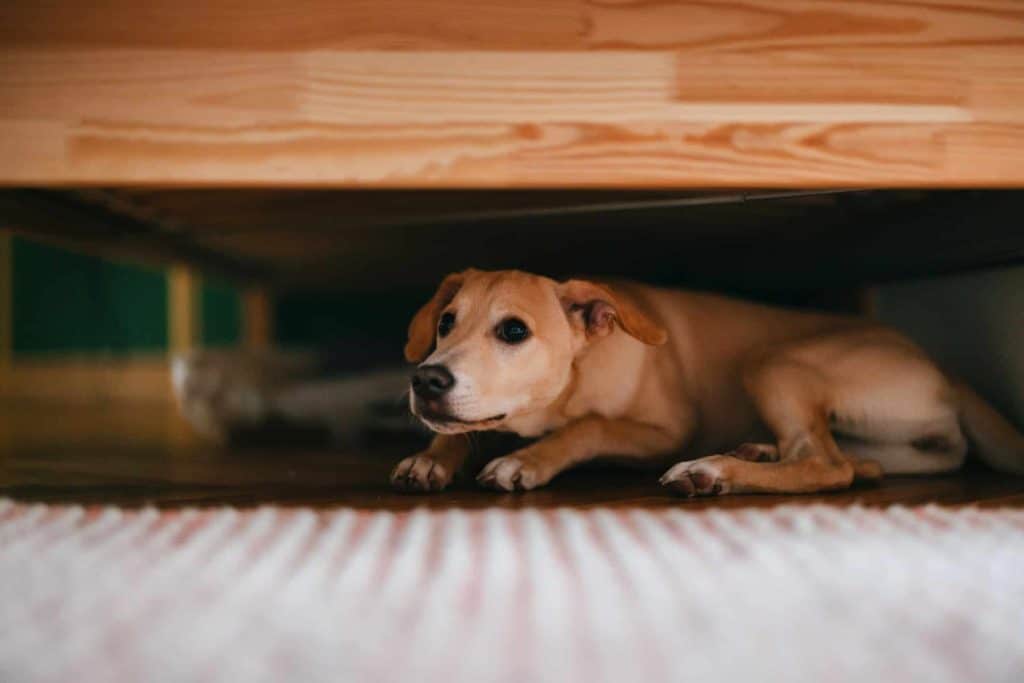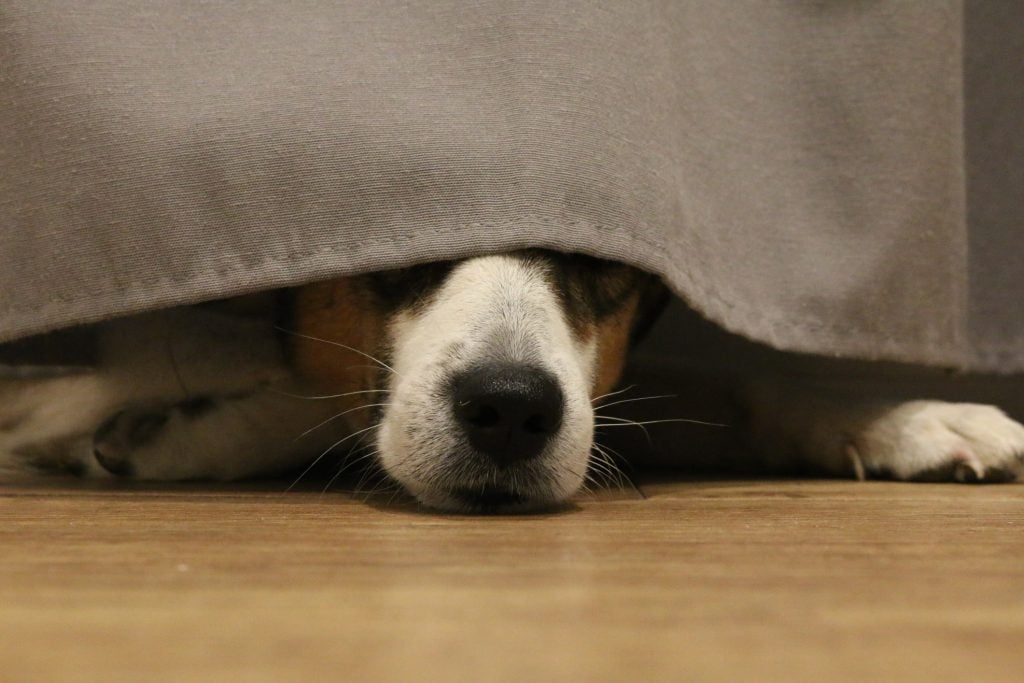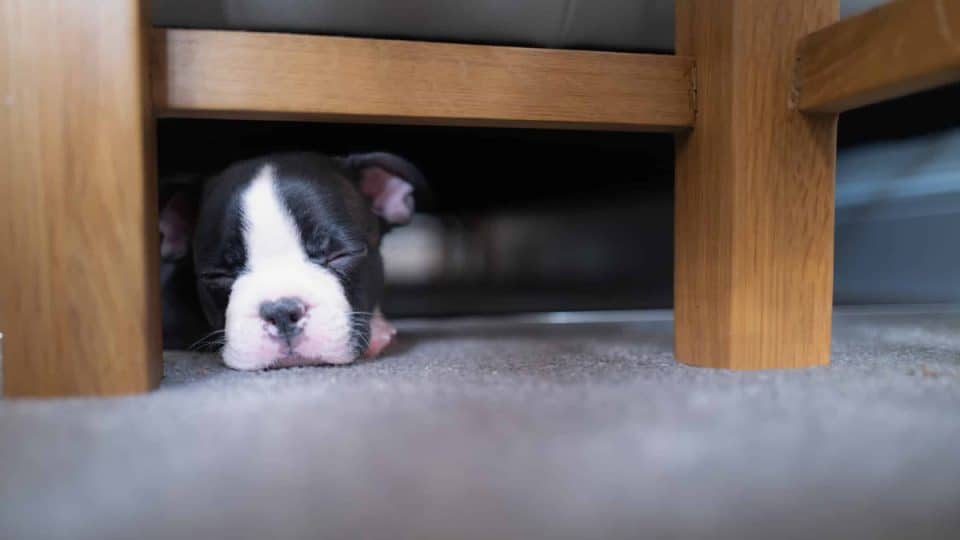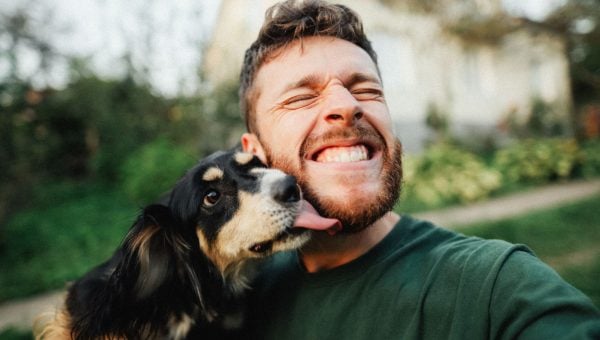Dogs have a knack for finding cosy hideaways, and it’s common to discover them snuggled under your bed. This peculiar sleeping spot might puzzle pet parents. But while it may seem odd, why dogs sleep under the bed—and occasionally spend their waking hours there—can be attributed to their instinctual desire for private space.
However, the underlying motivations for seeking such solitude can vary significantly from one dog to another. “Dogs like having private den-like spaces,” explains Meaghan Thomas, DVM, a veterinarian at East Ridge Animal Hospital. “It can become a safe space for them, like under a table or in a kennel.” She adds that dogs often retreat to these safe spaces due to injury, illness, and anxiety.
Below, we’ll explore the factors contributing to a dog’s need to sleep under your bed and what to do if it becomes a persistent problem.
4 Reasons Your Dog Sleeps Under The Bed
A range of emotions can drive under-the-bed sleeping in dogs—not always illness. It can stem from a desire for comfort, privacy, and closeness to their pet parents. Due to their den animal instincts, dogs often sleep in small, enclosed spaces. Dogs may retreat there after mischievous moments or to recover from playful antics.
However, under-the-bed hiding can signal anxiety, fear, or physical discomforts like sickness or pain. Understanding these emotional factors help pet parents comprehend their dogs’ needs and wellbeing. Dr Thomas outlines these possible reasons below.
- Comfort and privacy. Dr Thomas explains that comfort and privacy go hand in hand when dogs sleep under a bed. She adds that these den-like sleeping spots make them feel safely secluded from predators.
- Closeness to pet parents. We know dogs love their pet parents. Dr Thomas adds that dogs choose spaces close to them for this reason. Under the bed is one of these close places!
- Recovery from embarrassing moments. Dr Thomas says the debate surrounding dogs and human emotions is ongoing. “We still aren’t 100% in agreement that dogs can feel secondary human emotions like guilt or shame,” she explains. Instead, your dog’s ‘look of guilt’ or running under the bed is likely a reaction to you being upset, not them feeling embarrassed or shame.
- Anxiety, sickness, or pain. When dogs are anxious, ill, or in pain, they seek comfort by retreating under a bed. Dr Thomas adds that noise phobias can also cause dogs to find somewhere safe. If your dog only recently started retreating under the bed and shows other symptoms, speak to a vet.

iStock/miniseries
Is Sleeping Under The Bed Risky for Dogs?
Rest assured, sleeping under the bed is typically not risky for dogs and may even provide them with a sense of security. The space under the bed usually offers ample room for dogs to enter and exit comfortably. It’s rare for dogs to get stuck under the bed. If you’re worried, remain attentive to your dog’s behaviour and monitor for any signs of anxiety or discomfort.
To create a safe sleeping environment, keep the area under the bed clear of any clutter or potential hazards if your dog shows consistent interest in sleeping there. By maintaining a clean and accessible space, you can further ensure the wellbeing and comfort of your canine companion.
Sleeping vs. Hiding Under The Bed: When to See a Vet
While sleeping under the bed can often indicate positive emotions such as closeness and comfort, hiding is a different story. If your dog is actively hiding under the bed, it may be a sign they are unhappy or scared. Here are signs to help you identify if your dog is hiding under the bed rather than sleeping.
Trembling or shaking
Dogs may shake and tremble when they feel fearful or anxious. This behaviour happens after a heightened emotional response triggered by whatever is causing them to seek refuge under the bed.
Excessive panting, drooling, or vocalisation
If your dog is panting, drooling, or vocalising more than usual, this can signal heightened stress or anxiety. Hiding under the bed may serve as a coping mechanism to find a sense of security during these anxious moments.
Reduced eye contact
Dogs experiencing fear or anxiety may avoid eye contact with their pet parents or others. When hiding under the bed, they can create a physical barrier away from eye contact, shielding themselves from potential threats or uncomfortable interactions.
Increased destructive behaviour
If your dog engages in destructive behaviour, such as chewing on furniture or other household items, while seeking refuge under the bed, it can signal anxiety or frustration. This behaviour stems from them feeling overwhelmed or attempting to alleviate stress through these actions.
Appetite and sleep pattern changes
Dogs hiding under the bed may exhibit changes, such as a decreased appetite, loss of interest in food, or disruptions in their sleep patterns.
Observing these accompanying signs and hiding is crucial to provide appropriate support and intervention for your dog’s emotional wellbeing. A dog behaviourist or veterinarian can help pet parents address these issues effectively.

iStock/Margherita Lettina
How to Stop Your Dog From Sleeping Under Your Bed
If you find your dog’s habit of sleeping under the bed undesirable, you’re not alone. Pet parents might want to redirect their dog’s sleeping preferences for several reasons, such as concerns about cleanliness, limited space, or difficulty accessing them. Here are a few methods to help you keep your dog from under your bed.
- Put up a blocker. Install a physical barrier, such as a dog gate or a low fence, to block off access to the area under the bed. This barrier prevents your dog from slipping underneath and encourages them to explore alternative sleeping spots.
- Encourage them to sleep in another area. Create an inviting and comfortable sleeping area for your dog in your preferred location. You might even want your dog to sleep on the bed with you instead! Use positive reinforcement techniques such as treats, praise, and rewards when your dog sleeps in the designated area instead of the under-the-bed retreat.
- Crate your dog at night. Consider crate training your dog as an alternative to sleeping under the bed. A dog crate can provide a secure and cosy den-like space for your pup to sleep. Introduce the crate gradually, making it a positive and comfortable space with delicious treats, comfy bedding, and enriching toys. Slowly extend your dog’s duration in the crate during the night while ensuring they feel safe and relaxed.
By implementing these measures with patience and consistency, you can help redirect your dog’s sleeping habits to more desirable locations and create a comfortable and suitable sleeping routine for you and your pup.





